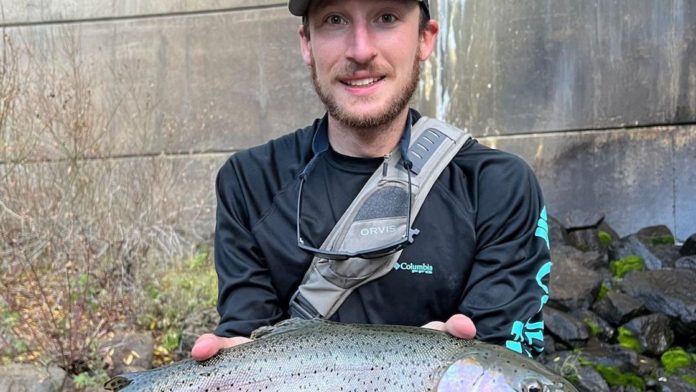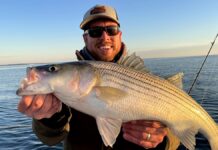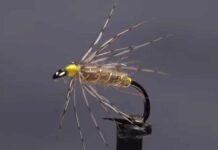Recently I have had conversations with anglers who have had some “poor” days of fishing over the past week. They went fishing based on reports from other anglers of only a few days before when the fishing was good. They fished the same areas and used the same presentations and tactics. So, what changed? Who knows? You would be rich if you could answer that question.
However, there are factors that may influence fish behavior. Everything from the moon cycle, wind, cloud cover, precipitation and location will have some influence — both on the fish we are trying to catch and on the food those fish are feeding upon.
My personal opinion is that weather plays a huge part in the equation. While I have had some good days fishing when the sky is blue, no wind and the temperatures is a balmy 70 degrees, they are not the norm.
My favorite time to fish is right before a storm front moves in. There is generally wind associated with it and clouds are moving in. I believe that fish can sense the change, probably through the drop in barometric pressure, and start feeding in anticipation of leaner times during the storm when food may be harder to find.
The choppy water caused by the wind and the lower light levels brought on by the clouds help protect fish from predators, especially avian predators. Other advantages of choppy water include stirring up the bottoms along shorelines freeing invertebrates that live in the bottom or on the bottom into the water column and adding action to my fly, lure or bait.
People are also reading…
The next time a storm front is getting ready to invade your favorite fishing hole, take advantage of it and get out the day before or the day it moves in. Earlier, I said my favorite time for fishing was right before a storm. Actually, my favorite time to fish is any day I can get out. As far as the person who complained about a “poor” day of fishing, I’ve never had one. Any day you can get out fishing is a good day. That day may not be the best for catching, but it is a great day for fishing.
WILDHORSESurface water temperatures have dropped into the mid 40s and the water is clear of algae. Trout fishing has been good while bass fishing has been slow to fair for numbers but fair to good for size. The middle of this week fishing seemed to slow on those very nice, clear windless days. Shore anglers are now doing as well as boaters for trout. While both Hendricks and Penrod arms have been producing trout, though fish are being caught at most of the popular spots around the lake. There really isn’t a bad place to fish. Chironomids, leech patterns and wooly buggers are still the best bet for fly anglers but the usual nymph assortment of copper Johns, hares ears, and pheasant tails have all been working. Bait anglers should be using worms or PowerBait fished off the bottom in shallower water or suspended several feet below a bobber. Small spinners should also be effective. Boaters have had success with flashers tipped with worms. Bass anglers have had success with crayfish pattern crankbaits and blade baits as well as deep diving minnow imitations. Orange or gold has also been a good color for perch, bass and trout. Expect to catch several perch between trout hookups. The lake is at 50% capacity and both prop rock in the canyon and the island off the state park are just barely above water. Both are still boating hazards. Wildhorse was stocked with approximately 2,000 rainbow trout last week with more expected this week.
SOUTH FORK RESERVOIRThe surface water temperatures mid-week were 47 degrees in the morning and 52 late on sunny afternoons. Bass fishing has been slow to fair for numbers but good for size. Trout fishing appears to slowed this week, but weather may have been the factor. Those fly fishermen that were catching fish report that they have been catching nice fish with a variety fly patterns including wooly buggers, leech patterns, red copper Johns, hares ears and chironomids (midge larva) patterns. Ice cream cones, red butt buzzers, red and silver zebra midges, red brassies and frostbite chironomids should all be working. Anglers are also having some success with spinners, worms and PowerBait fished from shore. Rainbow trout-colored spinners continue to be effective. Blade baits, crankbaits and soft plastics have caught a few nice bass though bass fishing has dropped off significantly. When fishing for bass this time of year, get deeper and fish more slowly. South Fork was stocked with more than 20,000 trout two weeks ago.
JIGGS/ZUNINO RESERVOIRAlmost dry and no fish.
WILSON RESERVOIRVery little change here. With surface water temperatures dropping into the high 40s, fishing for trout has been fair to good while bass fishing is just fair. Time to switch to blade baits and crankbaits for bass. For the bait anglers, worms seem to be working better than PowerBait for trout. Spin fishermen should be using blue or green spinners with silver blades. Fly rodders should have some success with leech and wooly bugger patterns. Nymphs include blue copper Johns, hares ears, PT’s and chironomids. The boat ramp is out of the water and is unusable. Cartopper craft only advised.
RUBY LAKE NWRThe cool fall days have made trout fishing productive in the collection ditch. Bass fishing is done in the south lake. While dry flies may still catch an occasional fish in the ditch, nymphs and streamers are the ticket right now. Leech patterns, balanced leeches, crystal buggers, #14-16 hare’s ears, and #16-18 PT nymphs and chironomids under an indicator are probably the best bet. Other flies working include the usual small nymphs, olive soft hackles, red or blue copper Johns, and prince nymphs. Some of the best fishing reported has been on the days that were cloudy and windy. On warmer afternoons if there appears to be a hatch, Griffith’s gnats and blue winged olives should be tried. Spin anglers should be using small spinners in black or olive with contrasting yellow or red colors. On brighter days, gold or silver lures seem to work better.
JAKES CREEK/BOIES RESERVOIR
Surface water temperatures have dropped into the mid to high 40’s and the water level is low. Algae and vegetation mats should have been blown off with the recent storm front that moved through. However, due to the lower water level, the best fishing access is still from a cartopper or float tube. Expect slow fishing for bass and catfish. The usual worms and PowerBait, as well as small spinners, rooster tails, and panther Martins should work for trout. Fly rodders should be using black or olive wooly buggers or leech patterns, hares ears, PT nymphs and chironomid patterns.
No recent report but trout fishing should be fair to good here as at other reservoirs. The same flies, lures and techniques that work at South Fork should work here.
For safety reasons and to expedite the rebuilding of the dam, the lake is being drained and anglers should avoid this lake. Water being drained will be diverted to Comins Lake and if conditions allow, NDOW will be performing a fish salvage moving the fish from Cave and taking them to Comins Lake. Shorelines will be very soft and dangerous due to the complete saturation of the soil as the lake is drained. By draining the lake it should shave a couple of years off the re-building of the dam and cut costs tremendously. It will also make the project much safer for those performing the work.
The new boat ramp should be useable now thanks to the hard work of volunteers from the Ely area and the contractor. Surface water temperatures are in the mid 40’s. Fishing has been slow for bass but good for 14 to 17-inch trout. Anglers will catch trout on nightcrawlers, spinners, nymphs and wooly buggers. Chironomid patterns under an indicator are effective here this time of year. Bass fishing is slow using crankbaits and spinnerbaits fished slowly for the best chance at a bass. Minnow imitations and large streamer patterns should work for northern pike. Anglers, please note that NDOW has placed radio tags in several Northern Pike. These pike will have an orange floy tag near their dorsal fin and a small antenna coming from their stomach. Please return these fish to the water for research purposes. If the pike doesn’t have the transmitter tag, please humanely dispatch the fish. Do not put it back in the lake. Anglers may catch an occasional Bluegill but NDOW is asking that those fish not be harvested since they are the founder population of what could be a fun pan fishery. Comins Lake was stocked with approximately 3,000 fish last week.
Surface water temperatures are in the mid 40’s here as well and fishing has been good. Best flies right now are leech or wooly bugger patterns. Brown Trout may still be targeted at the inlet end of the reservoir but that is ending any day. Fly rodders will also do well on bead head pheasant tails, wooly buggers, chironomids and parachute Adams. Spinners, PowerBait, and nightcrawlers will do well for the spincasting crowd.
The lake received a fair amount of snow last weekend, but NDOT plows were busy keeping the road open. No recent report on fishing here, but with winter coming on expect it to be fair to good while there is still open water. There has been ice forming around the edges of the lake. Good flies for stripping include mini leeches, crystal buggers, slumpbusters and wooly buggers (size 10 or smaller). Nymphs such as PT’s, hares ears, zebra midges, soft hackles and chironomids fished under indicators should be productive. Small dark colored spinners with contrasting bright spots have caught trout as well. As usual, bait anglers seem to have the best luck here with worms.
With the recent snows, access to the alpine lakes is getting more difficult. With colder temperatures at the higher elevations the lakes are starting to freeze and fishing is done for the year. There will be no more fishing reports on the backcountry lakes until next spring.
Stream flows continue to be closer to normal than a few weeks ago as a result of last couple of week’s precipitation and plants going dormant no longer using ground water. Central Nevada didn’t receive as much precipitation as northeastern Nevada did so the streams in that area haven’t rebounded like those in Elko County. With colder water temperatures due to snow melt, fishing streams associated with that melt will be slow to fair. As of November 4, the East Fork of the Owyhee was flowing at 16.5 cfs near Mountain City, the Bruneau River at 16.5 cfs, the Jarbidge at 10 cfs, Salmon Falls Creek at 50 cfs, Lamoille Creek at 10 cfs, the South Fork of the Humboldt at 9.5 cfs, Cleve Creek at 4.5 cfs, Steptoe Creek at 2.4 cfs and Kingston Creek at 3.7 cfs.
Credit: Source link































